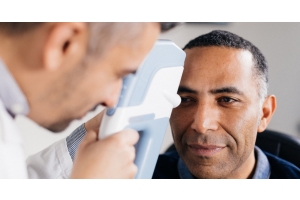
If you’re considering how to become an optometrist, you may already have a good idea of how varied and rewarding a career in healthcare can be.
Optometrists can significantly impact people's lives – particularly when considering poor vision is one of the top three disabilities worldwide. They perform eye exams, diagnose vision conditions, prescribe corrective therapy and identify life-threatening conditions like diabetes or brain tumours.
Although commonly confused, optometrists are different from ophthalmologists, who are also physicians with education from a medical school. Optometrists deliver primary health care for eye conditions and refer those who need surgery to ophthalmologists.
Starting out: Training to Become an Optometrist
One of the great things about the ophthalmology industry is there are different ways to start your training.
No matter which route you choose, thinking carefully about your GCSEs is an excellent place to start. Most universities look for at least five GCSEs or equivalent at grade 4 and above (A*-C) including English, maths and science.
Scottish Higher students will need a minimum of five subjects, including science subjects; Irish Leaving Certificate students need six subjects, including science.
Here are some of the ways you can train to become an optometrist
Degree Apprenticeship
Perfect for those who enjoy hands-on training and want to earn while they learn. With the right qualifications, you can start an apprenticeship from the age of 18.
As an apprentice, you will gain the practical skills needed to kickstart your career and gain a nationally-recognised qualification.
Specsavers offer apprenticeships or you can search for other available apprenticeships at www.findapprenticeship.service.gov.uk
University
If you choose to take a university degree in optometry, there are plenty of universities that offer great optometry degrees. Search on the NHS course finder.
While entry requirements vary from course to course, you will need to achieve high grades in the qualifications you have taken, including at least two science subjects.
Become a Qualified Optometrist
Most optometrists complete a BSc in optometry and then develop their practical skills through a ‘pre-registration’ year of assessed clinical training in practice.
All optometrists practising in the UK must register with the General Optical Council (GOC). The GOC is the profession’s regulatory body.
To register with the GOC as an optometrist, you need to complete a GOC-approved degree in optometry and complete the College of Optometrists’ Scheme for Registration.
Following a successful final assessment, you will be fully qualified and can register with the General Optical Council as an optometrist.
In addition to entering an interesting and varied profession, you can continue to learn and complete training throughout your career to maintain your professional status.
There is also the option to take higher qualifications and to enable you to specialise in areas of interest, including
-
- Geriatric optometry
- Ocular disease
- Paediatric optometry
|
Interested in learning about what equipment optometrists use? Read this simple guide |
Gaining Industry Work Experience
If you are interested in a career in optometry but would like to get more of a feel for the industry, consider contacting your local opticians and arranging some work experience.
During your optometry training – before achieving GOC registration – gaining work experience during the weekends or holidays will be beneficial in helping to set you apart from other graduates being considered for positions.
Careers in optometry
Once you have qualified in optometry, there are all sorts of opportunities and roles to explore.
If you’re wondering how much you could earn as an optometrist, the average salary in the UK is £31,365-£62,001; however, some companies pay £150,000-plus.
Love working with people in a customer-facing setting? Working as a community optometrist within a high street optometrist or as a hospital optometrist within a clinic could be for you.
Want to develop life-changing eye care and vision loss solutions? You may prefer a research role within a university or laboratory.
Always dreamed of owning your own business? Or working all over the world? With the right skills and experience, the opportunities within optometry are endless.
Keeler for high-quality optometry exam room equipment
The Keeler Student Team is here to help you get the best from Keeler whilst you’re in uni and during your pre-reg year.
We offer a range of student equipment to get you started, including:
- Student Professional Set
- Student Specialist Set
- Student Universal Trial Frame UB4
- Student Cross Cylinders
Get in touch if you need any advice on your existing items, want to discuss our range of products or take advantage of the special student prices available to you.









